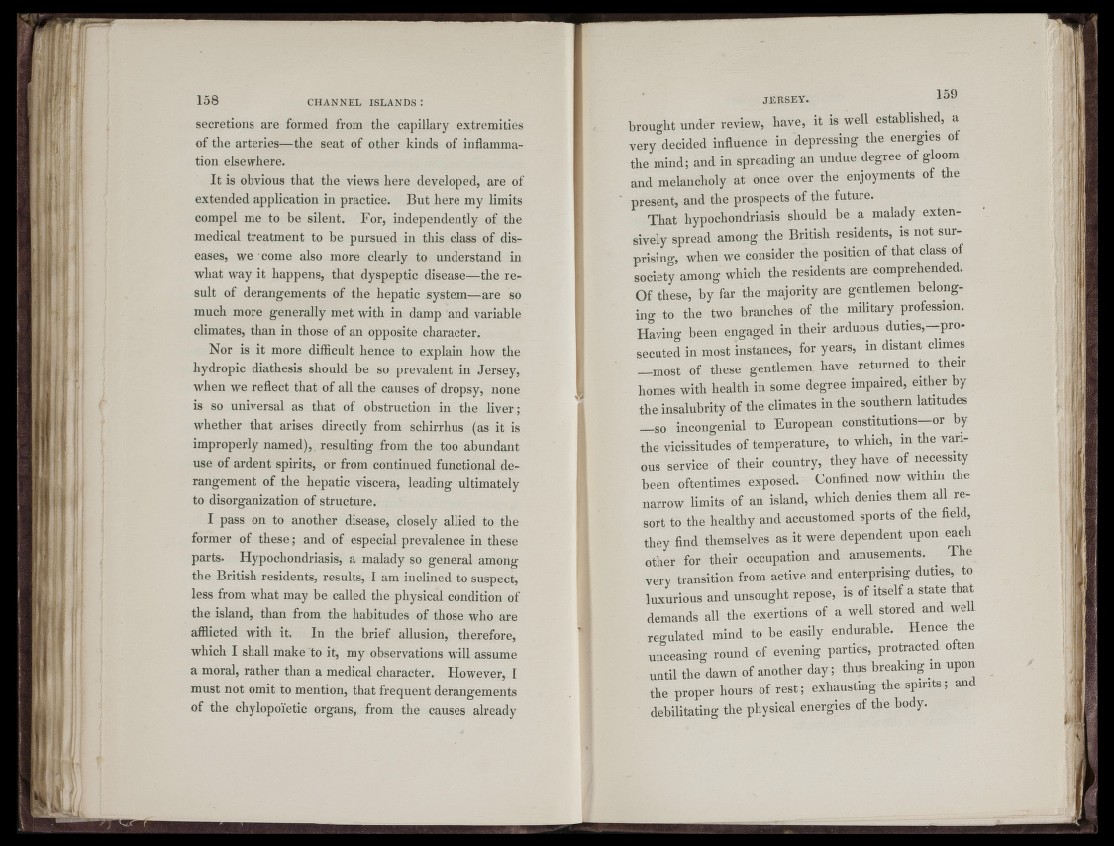
I;
secretions are formed from the capillary extremities
of the arteries—the seat of other kinds of inflammation
elsewhere.
It is obvious that the views here developed, are of
extended application in practice. But here my limits
compel me to be silent. For, independently of the
medical treatment to be pursued in this class of diseases,
we come also more clearly to understand in
what way it happens, that dyspeptic disease—the result
of derangements of the hepatic system—are so
much more generally met with in damp and variable
climates, than in those of an opposite character.
Nor is it more difficult hence to explain how the
hydropic diathesis should be so prevalent in Jersey,
when we reflect that of all the causes of dropsy, none
is so universal as that of obstruction in the liver;
whether that arises directly from schirrhus (as it is
improperly named),, resulting from the too abundant
use of ardent spirits, or from continued functional derangement
of the hepatic viscera, leading ultimately
to disorganization of structure.
I pass on to another disease, closely allied to the
former of these; and of especial prevalence in these
parts. Hypochondriasis, a malady so general among
the British residents, results, I am inclined to suspect,
less from what may be called the physical condition of
the island, than from the habitudes of those who are
afflicted with it. In the brief allusion, therefore,
which I shall make to it, my observations will assume
a moral, rather than a medical character. However, I
must not omit to mention, that frequent derangements
of the chylopoi'etic organs, from the causes already
brought under review, have, it is well established, a
very decided influence in depressing the energies of
the mind; and in spreading an undue degree of gloom
and melancholy at once over the enjoyments of the
present, and the prospects of the future.
That hypochondriasis should be a malady extensively
spread among the British resffients, is not surprising,
when we consider the position of that class oi
society among which the residents are comprehended.
Of these, by far the majority are gentlemen belonging
to the two branches of the military profession.
Having been engaged in their arduous duties,—prosecuted
in most instances, for years, in distant climes
—most of these gentlemen have returned to their
homes with health in some degree impaired, either by
the insalubrity of the climates in the southern latitudes
—so incongenial to European constitutions—or by
the vicissitudes of temperature, to which, m the various
service of their country, they have of necessity
been oftentimes exposed. Confined now within the
narrow limits of an island, which denies them all resort
to the healthy and accustomed sports of the field,
they find themselves as it were dependent upon each
other for their occupation and amusements. The
very transition from active and enterprising duties, to
luxurious and unsought repose, is of itself a state that
demands all the exertions of a well stored and well
regulated mind to be easily endurable. Hence the
unceasing round of evening parties, protracted often
until the dawn of another day; thus breaking m upon
the proper hours of rest; exhausting the spirits; anc
debilitating the physical energies of the body.
[
Ik i ; ii